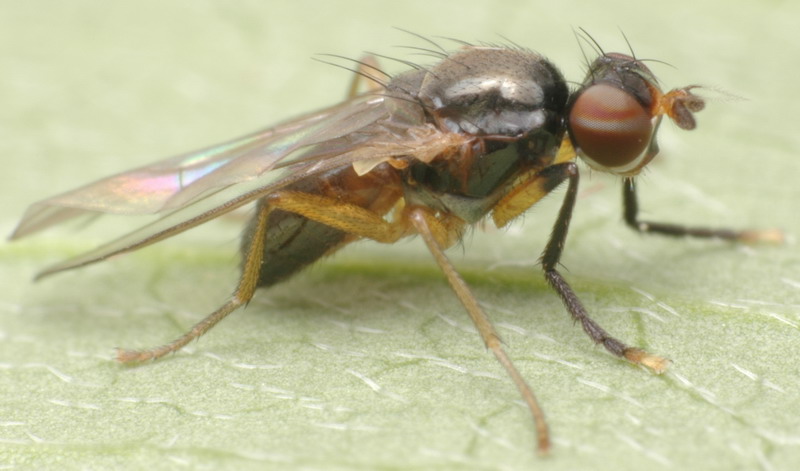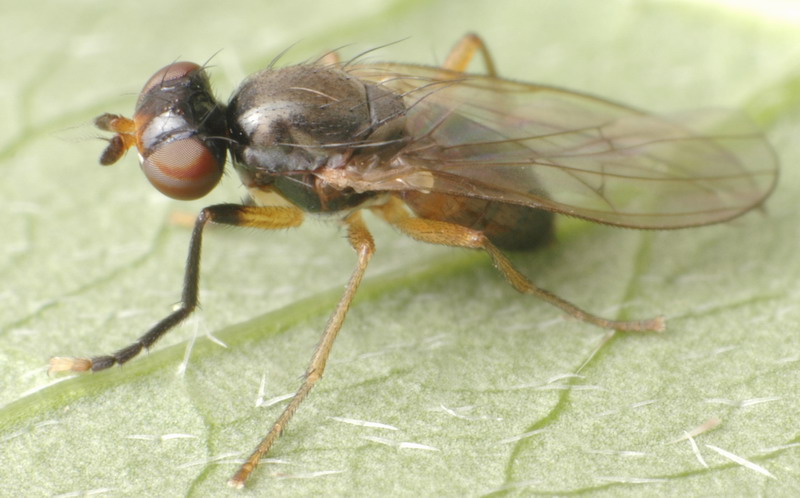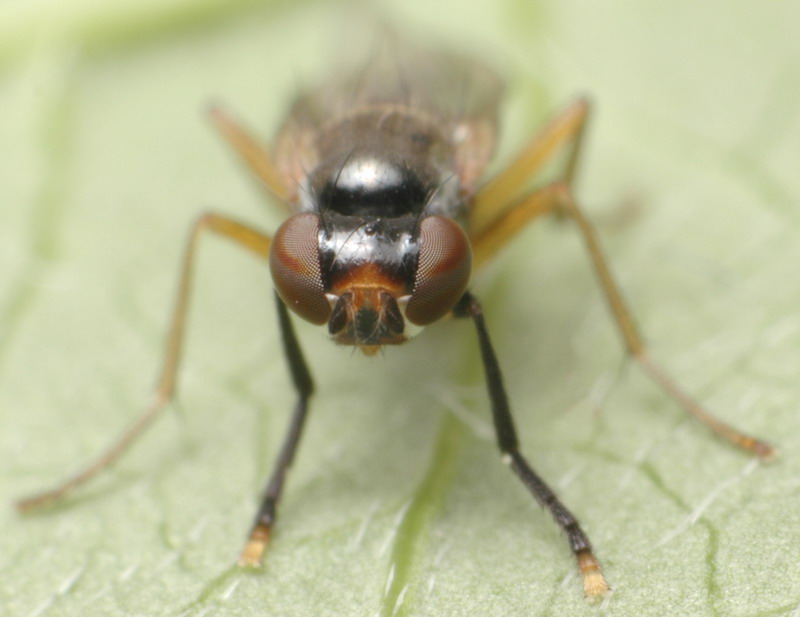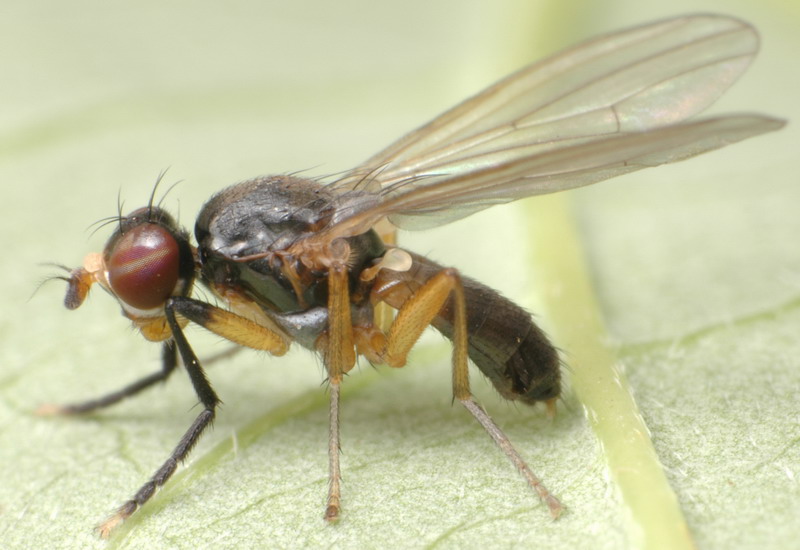Diptera.info :: Identification queries :: Diptera (adults)
|
Another Piophilidae (?)
|
|
| Dmitry Gavryushin |
Posted on 23-07-2006 12:53
|
|
Member Location: Moscow region, Russia Posts: 3345 Joined: 17.10.05 |
July 21, 2006. A single specimen was collected by sweeping. Size 2.5 to 3mm. I think it's a different species than the two I posted earlier (if it's only a Piophilidae at all). Dmitry Gavryushin attached the following image:  [104.38Kb] Edited by Dmitry Gavryushin on 23-07-2006 12:55 |
|
|
|
| Dmitry Gavryushin |
Posted on 23-07-2006 12:53
|
|
Member Location: Moscow region, Russia Posts: 3345 Joined: 17.10.05 |
Another view.
Dmitry Gavryushin attached the following image:  [124.36Kb] |
|
|
|
| Dmitry Gavryushin |
Posted on 23-07-2006 12:55
|
|
Member Location: Moscow region, Russia Posts: 3345 Joined: 17.10.05 |
A frontal view.
Dmitry Gavryushin attached the following image:  [94.52Kb] |
|
|
|
| Nikita Vikhrev |
Posted on 23-07-2006 13:16
|
|
Member Location: Moscow, Russia Posts: 9512 Joined: 24.05.05 |
I think that stripped eyes lead us rather to Sciomyzidae. It seems that everything OK for Pteromicra oldenbergi, Sciomyzidae. The main problem - it is RARE species, so let's wait for expert, but please meanwhile be carefull with collected fly in case that I'm right. Nikita Nikita Vikhrev - Zool Museum of Moscow University |
|
|
|
| Dmitry Gavryushin |
Posted on 23-07-2006 15:16
|
|
Member Location: Moscow region, Russia Posts: 3345 Joined: 17.10.05 |
OK thanks a lot Nikita |
|
|
|
| Kahis |
Posted on 23-07-2006 16:29
|
|
Member Location: Helsinki, Finland Posts: 1999 Joined: 02.09.04 |
I believe it is Pteromica glabricula. Very close to oldenbergi, but the latter species has no orange on frons (glabricula has narrowly orange anterior margin). The 1st picture shows some yellow near the base of the 3rd antennal segment even if it is not well visible. Kahis |
| Nikita Vikhrev |
Posted on 23-07-2006 17:09
|
|
Member Location: Moscow, Russia Posts: 9512 Joined: 24.05.05 |
Hi Kahis. But in Stakelberg key P. oldenbergi - striped eyes (on alive fly), 1 or; P. glabricula - 2or, eyes without strip. I think there is only 1 or? Nikita Nikita Vikhrev - Zool Museum of Moscow University |
|
|
|
| Kahis |
Posted on 23-07-2006 18:49
|
|
Member Location: Helsinki, Finland Posts: 1999 Joined: 02.09.04 |
I guess Stackelberg uses the name glabricula for the species now known as angustipennis. This misuse was corrected only in 1970. The real glabricula is probably P. nigrimana or P. albitarsis (or missing alltogether) in your key. P. glabricula is a species with only one orbital seta on each side. I don't know if it has banded eyes when alive. Edited by Kahis on 23-07-2006 18:50 Kahis |
| Nikita Vikhrev |
Posted on 23-07-2006 19:08
|
|
Member Location: Moscow, Russia Posts: 9512 Joined: 24.05.05 |
Thank you Kahis. Nikita. P.S. According Stakelberg banded eyes - oldenbergi and nigrimana. Nikita Vikhrev - Zool Museum of Moscow University |
|
|
|
| Dmitry Gavryushin |
Posted on 30-07-2006 13:09
|
|
Member Location: Moscow region, Russia Posts: 3345 Joined: 17.10.05 |
It seems that this species is rather common in appropriate habitats. Yesterday I've collected 20+ specimens by sweeping at Ozhigovo station (ca. 55km SW of Moscow). It was a very wet deciduous forest (Alnus/Ulmus/P. tremula) near a swamp, with thick and diverse herbaceous vegetation (including Carex, Phragmites, high broad-leaved grasses, Lysimachia, Solanum dulcamara, Oenanthe, Delphinium, Impatiens, Galium, Veronica, Scutellaria galericulata, Lycopus, etc.). There was also a lot of dead trees, both standing and fallen on the ground.
Dmitry Gavryushin attached the following image:  [118.62Kb] |
|
|
|
| Nikita Vikhrev |
Posted on 30-07-2006 14:27
|
|
Member Location: Moscow, Russia Posts: 9512 Joined: 24.05.05 |
Now all completely according with Rozkosny and Kahis - antennae 3-d vetro-basaly yellow - Pteromica glabricula.
Nikita Vikhrev - Zool Museum of Moscow University |
|
|
|
| Dmitry Gavryushin |
Posted on 04-08-2006 09:40
|
|
Member Location: Moscow region, Russia Posts: 3345 Joined: 17.10.05 |
I collected three more specimens on August 03, 2006 in our town park, not far from water again, so it's another proof for my previous remark on this species occurence in my neighbourhood. |
|
|
|
| Jump to Forum: |













